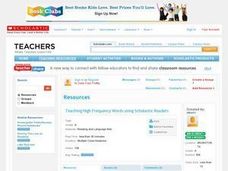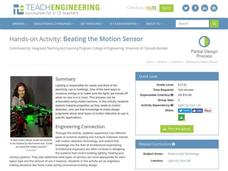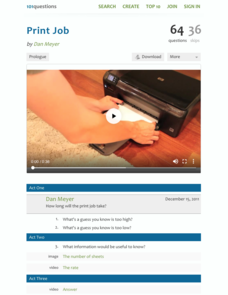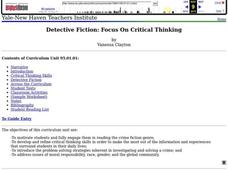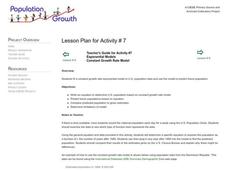Curated OER
Teaching High Frequency Words
Study high frequency words and illustrate them with young scholars. They will use charts to practice the words. They will also do a picture walk with the book they are reading and use the high frequency words in sentences. In the end,...
Curated OER
My Community Book
Young learners examine different places in their neighborhood using informational texts. First they identify a place that they like to play and predict if it will be in the nonfiction book Community at Play.They will share their favorite...
Curated OER
How Far Can You Jump?
Students estimate the distance of student's broad jumps. This activity can take place in the block center with a small group of students. They are explained that they are going to jump from a starting point (marked with the masking...
Curated OER
NUMB3RS Activity: Where’s the Source? Episode: “Undercurrents”
Several real-world problems are posed as a way to learn about vector fields in order to make some predictions after analyzing the data. The main problem comes from the tv show NUMB3RS and is based on solving a crime where a body has...
Curated OER
Bar Graphs and Survey Questions- Internet Access
In this graphing and data collection activity, students examine a bar chart that show data collected from 1998 - 2006 that shows the percentage of households that have Internet access. They answer questions based on the chart and make...
Curated OER
Similarity: Instructional
In this similarity worksheet, students solve and complete 7 different problems that include determining various dimensions of mirrors shown. First, they find the length of the diagonal of the large mirror in the diagram. Then, students...
Curated OER
Zoom Out - Terry Winter's "Rhyme"
Students predict and draw what a picture would look like if a camera zoomed out on it. In this visual arts instructional activity, students listen to a reading of Istavan Banyai's, Zoom before looking at an image of "Rhyme" by Terry...
Curated OER
ELD Lesson Plan: Courage
What is true courage? Your class can explore the answer with these three Houghton-Mifflin stories ("Hatchet," "Passage to Freedom," "Climb or Die," and "The True Confessions of Charlotte Doyle"), which feature courageous characters and...
Science Friday
Fossil Detectives
What can this rock be? Pupils pretend to be paleontologists by sketching fossils and making predictions about their types. To determine whether they can identify the type of dinosaur, class members compare their observations and...
Illustrative Mathematics
Tossing Cylinders
Everyone loves a lesson that involves throwing things around! To understand probability, your experimenters will predict how different cylinder-shaped objects will land when tossed. When the data is collected, they will calculate the...
Teach Engineering
Beating the Motion Sensor
I bet I can cross the room without having the lights come on. Class members set up an experiment in which they try to determine what materials will mask motion detected by a sensor. Groups predict how materials will interact with light,...
It's About Time
Atoms with More Than One Electron
Provide young chemists with the ability to manipulate atoms and predict their results, in this sixth lesson. Pupils analyze energy patterns as they predict the amount of energy required to remove electrons from atoms. They compare trends...
Balanced Assessment
Monitor Pricing
Out with the old and in with the new. Learners use a set of prices of computer monitors from 1994 to make a prediction. They then use one current price and what they know about the old prices to make a more recent prediction. Their...
Noyce Foundation
Cut It Out
Explore the mathematics of the paper snowflake! During the five lessons progressing in complexity from K through 12, pupils use spatial geometry to make predictions. Scholars consider a folded piece of paper with shapes cut out. They...
GeoGebra
Getting on the Right Wavelength
Predict an equation that waves up and down. Pupils set the height, radius, and period of a Ferris wheel. The learners write a sine equation to match the graph of the height of a point on the wheel as a function of time. Running the...
101 Questions
Toilet Paper Roll
You won't want to flush a great lesson down the drain! An intriguing resource asks learners to predict the number of sheets of toilet paper on a roll. Presented with the dimensions of the roll and one sheet of paper, scholars make...
101 Questions
Print Job
A watched printer never finishes—or does it? Engage your classes in a ratio and proportion task that asks them to predict how long it takes to print the numbers one through 88 on 88 sheets of paper. They use video to determine the rate...
EngageNY
Building Background Knowledge: Introducing Pygmalion
Learners take a gallery walk around the room to view images and text of Victorian England culture and then complete a Predictions Walk note-catcher as they circulate and take turns reading quotation strips from Pygmalion. Class members...
EngageNY
Introducing Historical Context: Narrative of the Life of Frederick Douglass
Is it possible to judge a book by its cover? Scholars analyze and make predictions using various cover images of Narrative of the Life of Frederick Douglass. They then discuss the difference between autobiographies and biographies....
EngageNY
Building Background Knowledge: The Myth of Cronus
Scholars look at and describe a picture of Cronus and Rhea and discuss the process of making predictions. Learners then use the images to write a prediction about the myth of the gods on an index card before completing guided reading...
Curated OER
Detective Fiction: Focus On Critical Thinking
Turn your 6th graders into detectives while growing their love of reading. Using critical thinking skills, they will be able to describe the five basic elements of detective fiction, read detective novels, make predictions, use the...
Shodor Education Foundation
Racing Game with One Die
Pupils roll a die to figure out which car advances on a race track. They determine the rules for each car moving forward and, given the statistics of the winner, compare if it matches their predictions.
Curated OER
Lesson 4: Fire, Rock, and Water
You can demonstrate the destructive force of volcanic mudflows to your early earth scientists using this lesson plan. Messy, but memorable, the two demonstrations require some preparation. Use one or both! Included is a link to activity...
Curated OER
Exponential Models
Students fit a constant growth rate exponential model to U.S. population data and use the model to predict future population. They write an equation to determine U.S. population based on constant growth rate model.
Other popular searches
- Making Predictions
- Predictions
- Predicting Outcomes
- Reading Predicting Outcomes
- Reading Making Predictions
- Make Predictions
- Pictures Story Predictions
- Lesson on Making Predictions
- Reading Predictions
- Story Prediction
- Predicting a Story


